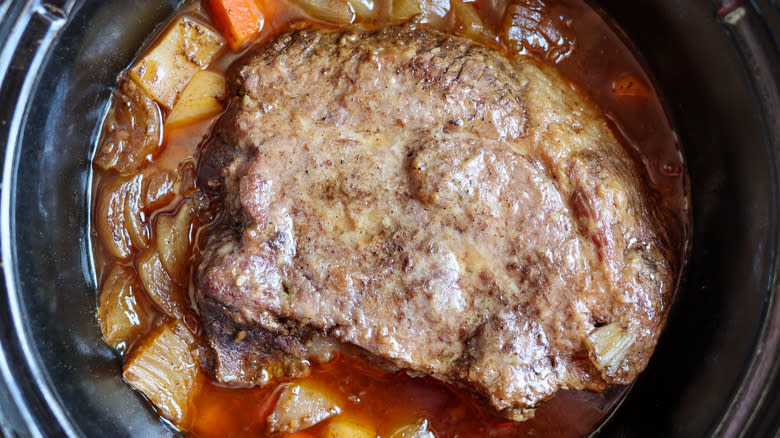The Key Braising Tip To Ensure Your Beef Has A Deeper Flavor

Braising is a bit of culinary alchemy that changes tough, sinewy meat into tender and succulent morsels with just a bit of time and moisture. If you wonder what cuts of meat are the best when braised, they're always the muscles that get used the most. That's what causes them to build up the connective tissue that becomes so meltingly delicious when braised. Although it's the heat of the braising liquid that does the trick, don't be tempted to flood your pan with too much wine or broth. This is not a case where more is better and where intuition might be more important than the recipe when adding liquid to your braising pan.
The braising liquid will be used as the sauce for your dish, whether it's succulent red wine braised short ribs or a simple beef stew. If you overload the pan with liquid, you'll drown out the beefy flavors that are extracted as the meat cooks and dilute the melted collagen that creates texture in the dish, making your finished sauce less concentrated. You'll also miss out on a bit of additional browning that happens on the surfaces of meat that bob above the broth or wine, which is another important source of flavor.
Read more: 8 Absolute Best Cuts Of Meat To Deep Fry
Coaxing All The Flavor From Your Braise

Although your recipe will suggest a quantity of wine or broth for the braise, it's important to consider that as a suggestion. Every pan has different dimensions. A wide braising pan might need less liquid to reach the right depth while a deeper, taller pan might take more. For instance, if you braise brisket, the size and cut of the meat will fill a Dutch oven differently than it would a deep cast iron pan. This means the amount of liquid will also vary. You're aiming for the meat to be nearly submerged, but the top of the beef should be dry and visible.
You may have noticed that braised meats taste even better the next day. That's especially true when the meat has cooled off in its flavorful braising liquid. The meat relaxes and reabsorbs some of the moisture as the spices and other aromatics in your recipe have time to meld together into a combination that's better than the sum of those individual ingredients. Making sure that you don't drown your meat can be the difference between amazing and mediocre braised meats.
Read the original article on Tasting Table.

 Yahoo Movies
Yahoo Movies 
